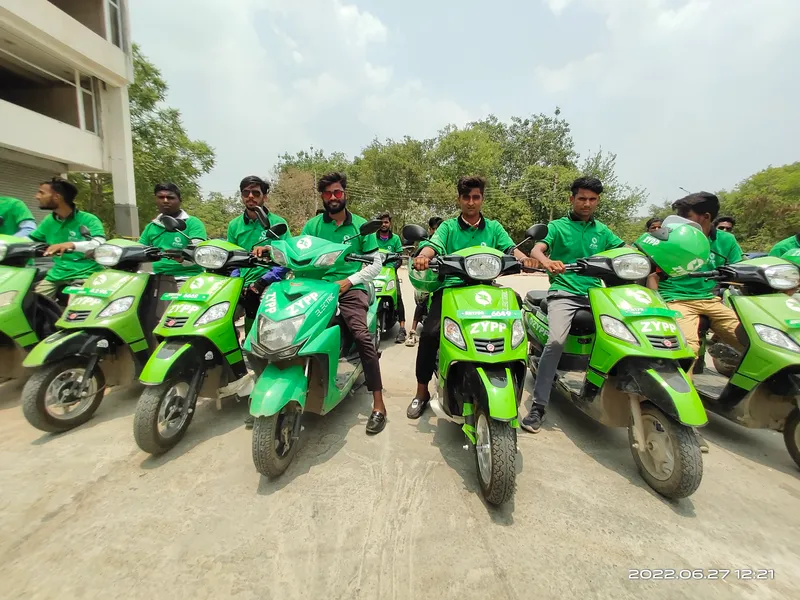From B2C mobility to last-mile delivery service, how Zypp Electric found its niche
The Turning Point is a series of short articles that focus on the moment entrepreneurs hit upon their winning idea. This week we feature Gurugram-based last-mile mobility service provider, Zypp Electric.
Last month, Zypp Electric, a service provider for last-mile mobility, raised $25 million (mix of equity and debt) in Series B funding led by Gogoro, a Taiwan-based battery swapping company.
The equity round of $20 million saw participation from new and existing investors, including Goodyear Ventures, 9Unicorns, WFC, Venture Catalysts, LetsVenture, IAN, IVY Growth, Grip, and angels investors, while the debt investment of $5 million came from global impact fund IIX and a large national bank.
Buoyed by the fresh infusion of capital, is keen to enhance operations across its service chain—improve driver experience, expand its EV (electric vehicle) hub infrastructure with Gogoro battery swapping technology, build its IoT- and AI-enabled EV fleet management technology, and grow its operations team by hiring across technology and top-level positions.
Zypp Electric enables last-mile operations for local merchants and ecommerce firms with a fleet of electric scooters and helps them cut delivery costs and reduce carbon footprint.
While service has always been the core of Zypp, the startup began its journey in 2017 with a B2C mobility service, offering electric scooters on rent/lease.
The founders of Zypp, Akash Gupta and Rashi Agarwal, used to travel extensively across the world on work trips. During their trips to Europe, they noticed the widespread adoption of EVs there. This led them to ponder over a solution that would help India embrace sustainable mobility and curb pollution.
In 2017, Akash quit MobiKwik where he was vice president of marketing, while Rashi left her job in LetsFlaunt to start Zypp Electric.
In the initial years, Zypp’s business focussed on last-mile commute for customers from metro stations to their offices. Customers could rent/lease electric scooters, pick them up from a metro station, commute to their office, and then drop them back at the station. This service was available in Gurgaon and a few parts of Delhi.

Challenges in EV space
The couple soon realised the challenges of running a mobility business in the EV space—need for huge capital, a huge fleet of bikes to meet the demands of customers, and a widespread charging/swapping infrastructure.
Even as Zypp manoeuvred its way through these challenges, it sensed another market opportunity opening up—EVs for delivery in the B2B space.
It was around 2019 when delivery firms were looking to add EVs to their fleets. It was a nascent market then with service providers doing a few pilots. Zypp decided to jump on the bandwagon and carve a niche for itself by operating a fleet of EVs and also managing drivers for ecommerce players and merchants.
The company created a core experimental team to build the technology stack and train and manage drivers.
“It was essentially a big pivot for us, because our initial thesis was to do only mobility. Now getting into managing people was never our core,” says Gupta.
Nevertheless, Zypp got into driver management and chose to run an asset light model. It doesn’t own the EVs but operates a fleet of e-bikes for deliveries in partnerships with EV players such as Gogoro, Sun Mobility, Hero Electric, and Kinetic Green.
The startup’s goal is to make last-mile delivery for local merchants and ecommerce giants carbon-free and also reduce delivery cost. It currently delivers groceries, medicines, food, and ecommerce packages from point to point through a fleet of fully automated IoT and AI-enabled scooters; they are low on maintenance and high on performance, says Gupta.
“We are trying to solve the problem of carbon emissions by electrifying the last mile delivery segment. We have already delivered 15 million deliveries on electric vehicles for a large pool of top ecommerce partners while saving around 33 million kg of CO2 till now,” says Gupta.
Powered by technology
Zypp provides real-time driver verification during onboarding and tracks the location of vehicles in real time. Its app is integrated with back-end services, through which the driver can start/stop the vehicle. Hence, all vehicles are keyless. This was made possible by using an IoT-based technology stack, says Gupta.
The technology also tracks, in real time, the performance and condition of batteries, which can be replaced at Zypp Electric Hubs installed at key touchpoints.
“The data analysis and intelligence layer helps us make quick fleet decisions for maintenance and operations,” says Gupta.
Growth and outlook
The startup scaled to 200 drivers before the pandemic in 2020. During the lockdown, when movement of only essential services was allowed, Zypp had a lot of requests from local merchants and ecommerce players to deliver goods.
The company says till date it has completed 15 million deliveries on EVs for partners such as , , , , , , , , , JioMart, , , , and in the cities of Delhi-NCR and Bengaluru. It also works with local merchants and kirana stores.
Recently, Zypp partnered with Taiwan-based Gogoro to set up swapping stations.
The company plans to expand its fleet of e-bikes from 10,000 now to 2,00,000 and widen its footprint from 6 Indian cities to 30 cities by December 2025.
“We want to be the delivery platform for all the 15 million executives (gig economy workers) in India,” signs off Gupta.
Edited by Swetha Kannan








